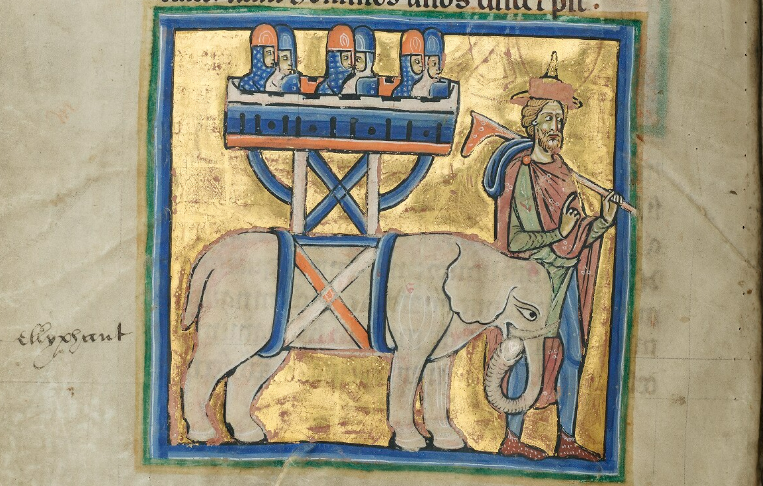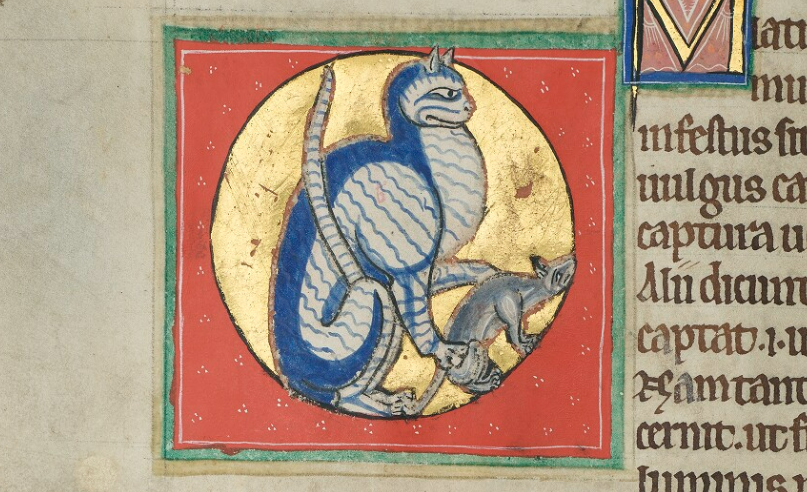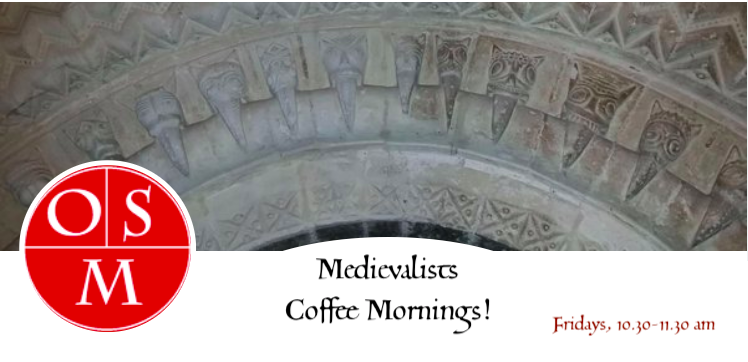We are heading towards the end of term but we still have plenty more events in store for you! Of course, the brevity of the Oxford term can make it feel as though the year is passing by very quickly, but we are still at the beginning of the calendar year. For those who, like me, are panicking that the weeks seem to be flying by at quite a pace, here is some comforting wisdom from the Epistolae project:
quantumcumque nobis videamur profecisse, semper iudicemus nos nondum nisi ad initium proficiendi pervenisse
[however much we may regard ourselves to be making progress we must always consider that we have only reached the beginning of our progress]
A letter (1093) from Anselm, archbishop of Canterbury to Ida of Lorraine
I take this to mean: even though Hilary Term and February are drawing to a close, we still have plenty of time to achieve fantastic medievalist things this year! Speaking of fantastic medievalist things, we have a full calendar of events and also many announcements this week – please peruse at your leisure:
ANNOUNCEMENTS:
- This Thursday: “The hooly blisful martir for to seke: Manuscripts with Chaucer’s pilgrims”. Oxford Medieval Society talk and manuscript session with Andrew Dunning (Bodleian, Jesus) and Alison Ray (St Peter’s, All Souls). Chaucer’s Canterbury Tales tell the story of pilgrims ‘from every shires ende / Of Engelond to Caunterbury they wende’. Experience these journeys, both real and imagined, at 15:00–16:30 at the Weston Library Lecture Theatre, where we’ll explore the Chaucer Here and Now exhibition at the Bodleian Library and enjoy a private showing of manuscripts relating to pilgrimage and Thomas Becket. Entry is free, and all are welcome. To have an idea of numbers, please let us know if you’re coming at oxfordmedievalsociety@gmail.com.
- Registration is now open for the 2024 Oxford Medieval Graduate Conference: ‘Signs and Scripts,’ which will take place on the 8th and 9th of April at the Maison Française d’Oxford. Please register for either in-person or online attendance at https://oxgradconf.wixsite.com/omgc/scripts-signs before March 15th. This year’s conference includes keynote lectures by Prof. Sophie Page (UCL) and Dr Hannah Ryley (Oxford).
- Postponed: OMS Classics Reading Group Due to a number of reasons, OMS Classics Reading Group will not meet again until Trinity term.
- Registration is now open for the Gender and Sainthood Conference! ‘Gender and Sainthood, c. 1100–1500’ will take place at the History Faculty on 5-6 April. Registration for in-person attendance is open until 10 March, and for online attendance until 3 April. Registration is open via this link: https://forms.office.com/e/rCinyKesGq. See the programme on our blog here.
- Exhibition: New College Library is hosting a special exhibition ‘Medicine and Anatomy’, on Thursday 29th February 12PM-4PM, and have got quite a few medical manuscripts on display! For further information, please email Caitlín Kane (caitlin.kane@new.ox.ac.uk).
- Room change: please note that the Medieval Women’s Writing research seminar on 29th February “Transforming the Material to Curate the Spiritual” will now take place at 47 Wellington Square Ground Floor Lecture Room 1.
- Registration open: University of Reading GCMS Conference 2024. Thu, 14 Mar 2024 09:30 – 16:30 GMT. Please join us for a day of fascinating papers on saints and angels, followed by an open discussion on the topic in a supportive environment. To register, please click here.
EVENTS THIS WEEK:
Monday 26th February:
- The Medieval French Palaeography Reading Group meets at 10.30-12 in the Weston Library. This group is open to anyone with an interest in Old French, Middle French and Anglo-Norman manuscripts. We study and read manuscripts from the 12th century to the late 15th century. If you are interested in joining the group or would like more information, please write to: laure.miolo@history.ox.ac.uk
- The Medieval Archaeology Seminar meets at 3pm in the Institute of Archaeology, Lecture Room. This week’s speaker will be Lyn Blackmore (Museum of London Archaeology), The seventh-century bed burial at Harpole: Aspects of recent work.
- The Medieval History Seminar meets at 5pm in the Wharton Room, All Souls College. This week’s speaker will be George Garnett (Oxford), ‘James Campbell, William Stubbs, and German Idealism’. The seminar will also be available via Teams: The Teams session can be accessed by logging in to Teams with your .ox.ac.uk account and joining the group “Medieval History Research Seminar” (team code rmppucs). Alternatively, it can be accessed via this link. If you have any difficulties please email: medhistsem@history.ox.ac.uk
- The Italian Research Seminar meets at 5.15pm at the Taylor Institution Library, Main Hall. Alessandro Scafi (Warburg Institute, London) will present a guest lecture entitled “Time, Space, and Matter: Dante and the Paradise Paradox.” All members of the university are welcome. For any inquiries, please do not hesitate to contact italian.res-sem@mod-langs.ox.ac.uk.
Tuesday 27th February:
- The Europe in the Later Middle Ages Seminar meets at 2-3.30pm in the Dolphin Seminar Room, St John’s College. Tea and coffee available from 1.45pm. Undergraduates welcome. This week’s speaker will be Trevor Dean, University of Roehampton, Families and Assassination Narratives in Italy and Europe.
- The Medieval French Research Seminar will meet at the Maison Francaise d’Oxford on Norham Road. Drinks will be available from 5pm; presentations start at 5.15pm. This week’s speaker will be Dr Kate Travers (St Hugh’s, Oxford) ‘French Narratives, Italian Contexts: Approaching Chivalric Literature in Northern Italy’. All are welcome! For more information or to be added to the seminar maillist, please contact helen.swift@st-hildas.ox.ac.uk
- The Medieval Church and Culture Seminar meets at Wellbeloved Room, Harris Manchester College. Tea & coffee from 5pm; papers begin at 5.15pm. This week’s speakers are Richard Gameson and Andy Beeby (Durham): aka Team Pigment, ‘Pigment Identification: how, when, where, and why‘. Everyone is welcome at this informal and friendly graduate seminar!
Wednesday 28th February:
- The Medieval German Seminar meets at 11.15, at St Edmund Hall, Old Library. Julia Lorenz and Marlene Schilling will discuss women and writ the writings by ‘Frau Ava’, the first women author whose name we know, transmitted in the Vorau Manuscript. We will work with the edition by Maike Claußnitzer and Kassandra Sperl. We will meet in the Old Library in St Edmund Hall. Tea and coffee are provided but please bring your own mug! Further information and reading recommendations via the teams channel; if you want to be added to that: please email Henrike Lähnemann.
- The Medieval Latin Document Reading Group meets at 4-5pm on Teams. A document is sent out in advance but homework is not expected. Please contact Michael Stansfield for further details and the Teams link.
- The Late Antique and Byzantine Seminar meets at 5pm at The Ioannou Centre for Classical and Byzantine Studies 66 St Giles and online via Microsoft Teams by clicking here. This week’s speaker will be Ekaterina Nechaeva (Université de Lille) – ‘Elite captives and defectors between Rome and Sasanian Iran. A prosopographical approach’.
- The “Unprovenanced” Lecture Series (hosted by the Centre for Manuscript and Text Cultures) meets at 5.15pm in The Memorial Room at The Queen’s College, Oxford. The speaker will be Yağmur Heffron, UCL, ‘Fruits of the poisonous tree: unprovenanced artefacts and the ethics of consuming archaeological knowledge’. For full details, please see our blog.
- Dante Reading Group meets at 5.30-7pm in St Anne’s College, Seminar Room 11. Each week, we will be reading through and discussing a canto of the Divine Comedy in a relaxed and informal setting, delving into Dante’s language and imagination in manageable chunks. The group is open to those with or without a knowledge of Italian, the reading being sent out in the original and in translation. Refreshments, both alcoholic and otherwise, will be provided! To register or ask any questions, please email charles.west@regents.ox.ac.uk (Sponsored by TORCH).
Thursday 29th February:
- The Ethics of Textual Criticism Seminar meets at 10-12 in Harris Seminar Room, Oriel College. This week’s speaker will be Daniel Wakelin (Oxford) – ‘Editing the everyday in Middle English’.
- A Book Presentation: THE LAILASHI CODEX: The Crown of Georgian Jewry – Survival in Soviet Times will take place at 11am in the McGregor Matthews room at New College, Oxford. The presentation will be convened by Dr Thea Gomelauri, Director of the Oxford Interfaith Forum, and Associated Member of the Faculty of Asian and Middle Eastern Studies at the University of Oxford. For more details please click here.
- The Middle Welsh Reading Group meets at 2-4pm in Jesus College, Habakuk Room. No previous knowledge of Middle Welsh is assumed. Translations will be provided with plenty of time to ask questions at the end. We’ll read a selection of early and late Middle Welsh prose and poetry to offer everyone a chance to experience the richness of Middle Welsh and its literary tradition. Please email to register your interest so that Svetlana knows how many people to expect: Svetlana Ó Siochfhradha Prešern.
- The Oxford Medieval Society talk and manuscript session “The hooly blisful martir for to seke: Manuscripts with Chaucer’s pilgrims”, with Andrew Dunning (Bodleian, Jesus) and Alison Ray (St Peter’s, All Souls) will take place at 3-4.30pm at the Weston Library Lecture Theatre. Chaucer’s Canterbury Tales tell the story of pilgrims ‘from every shires ende / Of Engelond to Caunterbury they wende’. Experience these journeys, both real and imagined, at the Weston Library Lecture Theatre, where we’ll explore the Chaucer Here and Now exhibition at the Bodleian Library and enjoy a private showing of manuscripts relating to pilgrimage and Thomas Becket.
- The Late Roman Seminar will meet at 4pm in the Seminar Room, Corpus Christi College. This week’s speaker will be Alan Ross (Ohio) ‘Julian in Gaul’.
- The Medieval Women’s Writing Research Seminar meets at 5-6.30pm at 47 Wellington Square Ground Floor Lecture Room 1. This week’s speaker is Carolin Gluchowski (New College, Oxford), Transforming the Material to Curate the Spiritual: Late-Medieval Prayerbook Revisions in the Cistercian Convent of Medingen. Stay up to date with events by joining our mailing list or following us on X @MedievalWomenOx. Funded by the “TORCH Critical-Thinking Communities” fund.
- The Celtic Seminar meets at 5pm, online via Zoom. Please contact a.elias@wales.ac.uk for the link. This week’s speaker will be Elaine Treharne, ‘Moved by the nature of art’: Welsh poets and the medieval’.
- The Old Occitan Literature Workshop meets at 5-6pm at Taylor Institution, Rm2. In Hilary term, we will read and translate extracts from texts written in Old Occitan. All welcome! Please email the address below for details of the texts we will be working on. Interested members will be invited to translate short passages which we will then workshop in meetings 2 and 3. To sign up, or for any other queries, email Kate Travers.
- The Oxford Old English Work-In-Progress Seminar (WOOPIE) meets at 5.15pm at St Cross Room, St Cross College. Today’s speaker will be Prof. Daniel Anlezark, University of Sydney: ‘The Origins of Anglo-Sacon Chronicle and the Eighth Century’. Followed by a drinks reception. All welcome – if you would like to attend, please contact Francis Leneghan.
- The Italian Research Seminar meets at 5.15pm at the Taylor Institution Library, Main Hall. Marta Arnaldi (Oxford) will moderate a joint book launch, “Creative Criticism and Other Stories: Elena Lombardi and Nicola Gardini in Dialogue”, for Elena Lombardi (Oxford) and Nicola Gardini (Oxford), who have respectively published Ulysses, Dante, and Other Stories (ICT Berlin Press 2023) and Io sono salute. Quando la letteratura incontra la medicina (Aboca Edizioni 2023). All members of the university are welcome. For any inquiries, please do not hesitate to contact italian.res-sem@mod-langs.ox.ac.uk.
- Sung Latin Compline in the Norman crypt of St-Peter-in-the-East (library church of St Edmund Hall) at 9:30pm. Contact Henrike Lähnemann if you would like to come and are not a member of St Edmund Hall.
Friday 1st March:
- The Medieval Coffee Morning meets as usual 10:30am in the Visiting Scholars Centre of the Weston Library (instructions how to find it) with presentation of items from the special collections, coffee and the chance to see the view from the 5th floor terrace.
- The Late Antique Latin Reading Group meets at 12-1pm, in the Hovenden Room, All Souls College, and is open to anyone engaged in research on the late antique world. Though prior knowledge of Latin is required, we welcome people with a range of abilities. We particularly welcome graduate students and early career academics. If you would like to attend, or you have any questions, feel free to contact either of the convenors. Please do RSVP if you intend to attend, so that we can gauge numbers and circulate the readings. Contact: David Addison and Alison John.
- Exploring Medieval Oxford through Lincoln Archives meets at 2-3pm, in Seminar Room 2, EPA Centre, Museum Road. Anyone interested in analyzing primary sources and conducting a comprehensive examination of the documents are welcome to attend. Those who are interested can contact Lindsay McCormack and Laure Miolo via email: Lindsay Mccormack and Laure Miolo
- The Tolkein 50th Anniversary Seminar Series meets at 4-5pm in Faculty of Classics Lecture Theatre. This week’s speaker will be Eduardo Gutierrez (University of Oxford), ‘Tolkien Beyond Tolkien: Unleashing the Sub-Creative Imagination in an Era of Bridge Building‘. Free access (no need to book).
- The Oxford Medieval Manuscripts Group (OMMG) meets at 5pm at Merton College, Mure Room. This week’s speaker will be Peter Kidd, Independent Researcher, ‘Provenance and Medieval Manuscripts: A Case Study’. Drinks reception and dinner at Gino’s. All welcome! To subscribe to our mailing list, participate in library visits, propose a presentation of your research for work in progress meetings, or submit any queries, please write to: elena.lichmanova@merton.ox.ac.uk.
- The Anglo-Norman Reading Group meets at 5-6.30pm, at St Hilda’s College, and on Zoom. Please let us know if you would like to attend, either in person or on Zoom. The text – some Jousting Letters from Edinburgh – will be provided via Padlet, and refreshments as usual to help us along. All welcome, at any level of Medieval French! Please contact Stephanie Hathaway or Jane Bliss for further details.
OPPORTUNITIES:
- The University of Exeter is delighted to advertise a PhD studentship, fully funded for four years from September 2024, for a project focusing on the learning of French in medieval Britain or in a related field of enquiry as more broadly conceived. Relevant fields might include historical linguistics, codicology, textual-literary studies and social, educational or intellectual history. The studentship will be attached to the project ‘Learning Anglo-French: French Language-Learning Manuscripts in Britain, c.1200-c.1500’, awarded by an ERC Consolidator Grant and funded by UKRI under the Horizon Europe guarantee scheme, and will be supervised by the project PI, Prof Thomas Hinton. Further details, including how to apply, can be found via the following link: https://www.exeter.ac.uk/study/funding/award/?id=5060. Potential applicants are encouraged to contact Prof Hinton (t.g.hinton@exeter.ac.uk) with any preliminary enquiries.
Finally, some more wisdom from Anselm as we move into March:
Vita praesens via est. Nam quamdiu vivit homo, non facit nisi ire.
[This life is a journey. For as long as man lives, he is always moving]
A letter (c.1107) from Anselm, archbishop of Canterbury to Basilia
I wish you productivity as we move into seventh week, and warmer days as we move into March and, soon, Spring! May your week be a journey of research discovery, medievalist joys, and Oxford sunshine!

St John’s College MS. 61, f. 10 v.
By permission of the President and Fellows of St John’s College, Oxford
Viewable in full at Digital Bodleian












